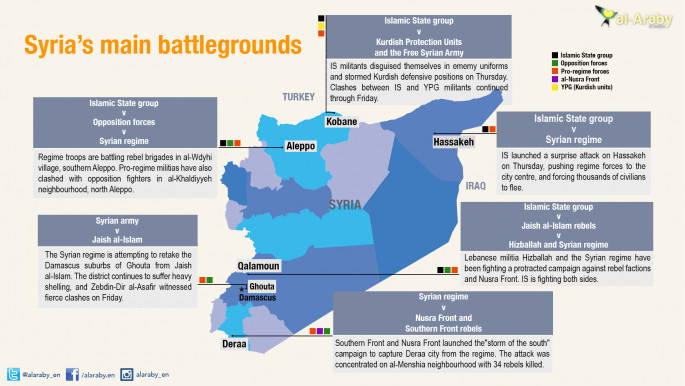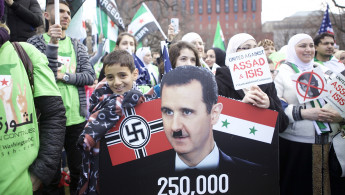Conflicting agendas set to clash at 'Vienna-III' Syria talks
The discussions will bring together around 20 countries and international bodies to hammer out a road-map for peace to end Syria's more than four-year civil war, and diplomats said working level talks are set to begin in advance Thursday.
| Jordanian King Abdullah II Wednesday criticised the 'Cold War mentality' that hampered previous negotiations |
Western officials have already dismissed a Moscow-authored political reform plan touted for the meeting - the second in Vienna in less than a month - saying it does not clarify what will happen to Assad.
Previous attempts to end the civil war, which has killed more than 250,000 people and forced millions from their homes, have stumbled over his fate. The West insists he must go, while Russia and Iran support the government.
Diplomatic efforts to resolve the conflict have gathered pace since Russia launched airstrikes in Syria in late September.
Moscow said they are aimed at stopping terrorists in the country, but Western powers have accused Russia of trying to help Assad's forces and the intervention has further soured already tense relations between the two sides.
Jordanian King Abdullah II Wednesday criticised the ''Cold War mentality'' that has hampered previous negotiations involving Russia and the West, saying Moscow is a key player in talks to clinch a political solution to the Syrian crisis.
''Working together in Syria allows us to build a block to be able to cope. We must do so together, we help each other. We need to be synchronised,'' he said in an interview with television channel Euronews.
 |
|
| [Click to enlarge] |
Opposition vs terrorists
A Western source in Beirut told AFP that the talks would aim for broad international agreement on opposition representatives to discuss a political transition with Assad's government.
''Each country will be able to submit names which will then have to be reduced to between 20 and 25 people to be divided into two commissions, one on political reforms and the other on security,'' the source added.
A European diplomat said an international preparatory commission will start work Thursday on pulling together the opposition lists, and which should be classified as ''terrorist'' organisations.
The distinction has been a source of contention between Assad supporters, such as Russia and Iran, and opposition backers in the West and the Arab world.
Russia has submitted a 38-person list, including three former heads of the exiled opposition National Coalition and its current president, Khaled al-Khoja, according to the Western source.
Saudi Arabia had put forward 20 names and Egypt 10, the source said.
Russia's Foreign Minister Sergei Lavrov and his Iranian counterpart Mohammad Javad Zarif echoed the sentiment, agreeing in a phone call the talks are not a ''substitute for negotiations between Syrians,'' according to a statement from Moscow.
Neither representatives of the Syrian government nor opposition groups are expected to attend this stage of the dialogue, and a member of the National Coalition criticised the process.
''Each state wants to send its representatives in the name of the Syrian opposition,'' said Samir Nachar.
''It's regrettable that the choice does not represent the interests of the Syrian people, and this process will not lead to a settlement of the Syrian crisis,'' he said.
| Read more: Assad's priority is defeating 'terrorists' before elections in Syria |
Russian peace plan dismissed
| Western diplomats dismissed the Russian plan, describing it as as 'back-of-the-envelope stuff' |
The United States and its European and Arab allies are demanding that Assad be forced to step down during the transition of power, but Iran and Russia disagree.
Western diplomats have dismissed the Russian plan, presented nearly two weeks ago, with one UN Security Council diplomat describing it as as ''back-of-the-envelope stuff'' and ''not the answer''.
It proposes an 18-month constitutional reform process, led by a constitutional commission made up of from ''domestic and outside opposition'' groups, not chaired by the president.
This would be followed by simultaneous parliamentary and presidential elections after the constitution is approved in a referendum.
But the document did not specify whether Assad could stand in those elections, while officials also took issue with its stipulation that the new president would be in charge of the military and intelligence services.
''That just isn't enough,'' said the Security Council diplomat, who asked not to be identified.
"It has to be part of the final deal that the end point will not have Assad in power.''
Farah Dakhlallah, Arabic spokesperson at the UK Foreign Office, told al-Araby al-Jadeed: ''The previous Vienna meeting was a good start, but we now want to achieve progress on the details of political transition. This will take time, but we are moving in the right direction.''
Dakhlallah stressed that the UK does not see any role for Bashar al-Assad in the future of Syria, saying he must step down before the start of any transitional process.
Iran's President Hassan Rouhani, meanwhile, said any resolution must focus on setting up a strong government in Damascus, not just Assad's fate, telling television channel France 2: ''(It is) not a question of a person, it is a question of security and stability''.
''What country has managed to fight terrorism without a strong state to fight terrorism?'' he said in the interview, also broadcast on Europe 1 radio.
 |
|
| [Click to enlarge] |





 Follow the Middle East's top stories in English at The New Arab on Google News
Follow the Middle East's top stories in English at The New Arab on Google News


